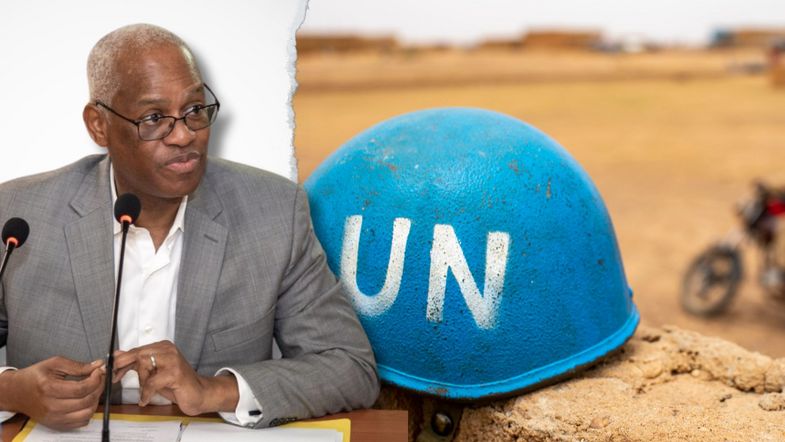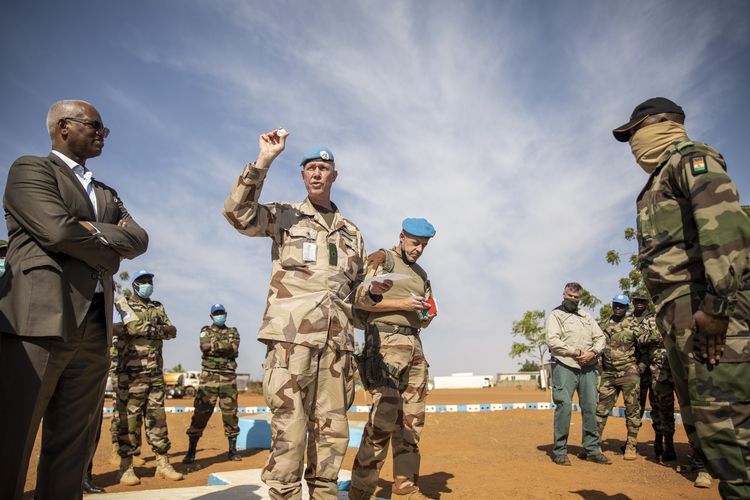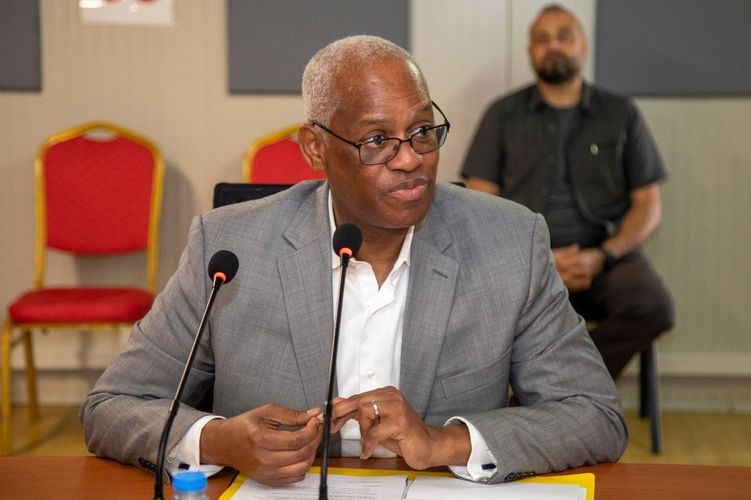Currently, Mr. Wane is supporting ReCentGlobe’s research project on ‘African Non-Military Conflict Intervention Practices’ (ANCIP), led by Prof. Dr. Ulf Engel of the Institute of African Studies. With over 25 years of practical and theoretical experience, he is an expert in conflict prevention and management in Africa, as well as in peacekeeping.
In this interview, he discusses the work of the UN peace mission in Mali, the challenges of bridging theory and practice in peace work, and the global multi-crisis.
Q: A sincere welcome to the Leipzig Research Center Global Dynamics. We are honored to have someone with your extensive experience in conflict prevention and peacekeeping, particularly in Africa. Could you briefly introduce yourself and share some insights into your previous work in Mali?
El-Ghassim Wane: Thank you. My name is El-Ghassim Wane, and I am from Mauritania. Over the last few decades, I have worked for the Organization of African Unity, which became the African Union in 2002. I also worked for the United Nations in various capacities, including as Assistant Secretary-General for Peacekeeping Operations, where I oversaw peacekeeping missions globally. Additionally, I was the head of the UN Mission in Mali, known as MINUSMA.
When I arrived, the mission had already been deployed for close to eight years. I remained in Mali for just under three years, working to implement the mission’s mandate, which is set by the UN Security Council. Our focus was primarily to help stabilize Mali following the crisis of 2012 and subsequent instances of political instability, including the coups d’état that took place in 2020 and in 2021. We supported the political process that aimed to bring a lasting solution to the recurring conflict in the northern part of the country through the Peace and Reconciliation Agreement arising from the Algiers Process. We also worked towards the stabilization of central Mali, which had been added to the mission’s strategic priorities in 2019, and the restoration of constitutional order, in conjunction with the regional organization, the Economic Community of West African States (ECOWAS), and the African Union.
Q: At the end of 2023, Germany concluded its involvement in the MINUSMA, and the last Bundeswehr soldiers left Mali. How would you evaluate Germany’s contribution to the stabilization of Mali, and what lessons can we learn from MINUSMA for future peacekeeping efforts?
El-Ghassim Wane: Since I am in Germany, I would like to take this opportunity to reiterate my deep appreciation to the German government for its outstanding contribution to MINUSMA and, more generally, for its steadfast support to peace and security in Mali. Germany played an important role, contributing a military contingent, which was stationed in Gao, and other uniformed individual personnel, as well as critical assets, including a level 2 hospital. They operated alongside other troop and police contributing countries from Africa, Europe, and Asia.
Germany was one of the last three European nations involved in the last phase of the mission’s lifecycle, the others two being Sweden and the United Kingdom, to whom I also would like to reiterate my gratitude. Beyond military contributions, Germany also provided significant financial support to the MINUSMA Trust Fund, which funded various projects across the central and northern parts of Mali, benefiting immensely local populations as well as the Malian authorities. One notable project funded by Germany was the renovation of Gao airport, which costed several million Euros and was valuable not only for the mission but also for the Malian population.
Reflecting on the broader MINUSMA experience, the mission operated in a very challenging context. It faced asymmetric threats from terrorist groups, in the face of which peacekeeping missions are not adequately configured and resourced. Additionally, political instability, including the coups d’état of 2020 and 2021, created a complex and often strained environment for the mission. Despite these challenges, I believe MINUSMA made significant contributions. Whenever I visited different regions in Mali, the local populations consistently asked for more support from MINUSMA and not for less. While expectations sometimes exceeded what we could deliver, and were sometimes beyond our mandate, we always did our best to assist. We also played a crucial role in advancing the peace agreement, facilitating a consensual way forward between Mali and ECOWAS on the return to constitutional order, and in stabilizing the central regions of Mali. The situation has since evolved in a different direction and MINUSMA has exited Mali.
When assessing the mission’s overall impact, it is important to remember that peacekeeping missions are meant to support, not substitute for, local efforts. Our ability to operate effectively is heavily dependent on the extent and quality of the cooperation we receive from the host country, including in terms of freedom of movement, and on the willingness of parties to a conflict to deliver on their commitments. Dismissing the mission as a failure would overlook both the many tangible benefits brought to Mali and the constraints we faced—such as regional tensions, geopolitical shifts, and objective limits on our ability to act independently of local dynamics. We could have done more. We could have done better. But we were not fully in control of the environment. We undeniably did a lot—the populations we served with dedication will not say otherwise. And we did so, making huge sacrifices; MINUSMA is the deadliest operation ever deployed by the UN. The UN was prepared to sustain its support, but had to depart Mali as the authorities requested its withdrawal.
Q: Bundeswehr operations abroad are often viewed critically by the German public, particularly when lasting positive effects seem absent, as was the case in both Mali and Afghanistan. Do you think military operations should still be part of peacekeeping, or are there better, more sustainable alternatives?
El-Ghassim Wane: It is overly simplistic to judge peacekeeping missions as either complete successes or failures. I’m currently leading a study on behalf of the Department of Peace Operations of the United Nations on the future of peacekeeping. Our report will be issued towards the end of this month, and we’re looking at the history of peacekeeping, trying to identify new models to keep it relevant and fit for purpose in the new and more fragmented environment we are living in. Despite its limitations, peacekeeping remains one of the most effective tools for international collective intervention. Studies have consistently shown that where peacekeepers are deployed, they manage to reduce the intensity, scope and duration of violence, contributing significantly to stability.
However, international actors can only support and facilitate. They cannot substitute for the political will of local actors to enact necessary reforms and achieve compromises. Compared to all other alternatives, peacekeeping remains the most cost-effective tool for fostering stability in conflict-affected regions. Obviously, peacekeeping must continue to evolve and adapt to the challenges confronting our world; and it has to do so learning from experience and from its own shortcomings.
Q: In conflict-ridden regions, there is always the concern of conflicts spilling over into neighboring areas. How likely is this in the case of Mali, and how can it be prevented?
El-Ghassim Wane: Mali was significantly affected by the fallout from Libya after the collapse of the Gaddafi regime in 2011, which led to an influx of weapons and armed fighters into the region. This is not to say that the Libya collapse was the sole factor that triggered instability and violence in Mali; there were also longstanding governance challenges and grievances which had not been addressed, creating a breeding ground for conflict. And the crisis in Mali obviously expanded to other parts of the region, Burkina Faso, for instance. Borders are artificial in a number of ways and poorly monitored, and the challenges faced by these countries—such as state-building, inclusivity, and governance—are similar. Therefore, it is no surprising that what happens in one country ends up affecting other countries.
Addressing spillovers requires sustained international engagement, much like what was attempted in Mali with the involvement of the UN, France’s Operation Barkhane, the European Union, the AU, and ECOWAS, as well as several bilateral actors. While the results may not have met expectations, it is also crucial to ask what might have happened had these interventions not taken place. International engagement, notably through the UN, has to be sustained, even though it will take a different shape and assume different modalities now that MINUSMA is no longer on the ground. The second element is regional cooperation—must in the face of challenges that do ignore borders and transnational in nature. Lastly, national stakeholders have a huge responsibility. It’s up to them to carry out the reforms needed and to govern their countries in ways that foster long lasting peace.
Q: You have over 25 years of experience in conflict resolution. What lessons can the field learn from your practical experience? Are there notable gaps between theory and practice?
El-Ghassim Wane: I do not see theory and practice as being far apart. In fact, I believe that policy and academic research are mutually reinforcing. No policy can succeed without being informed by sound knowledge, and no research can be impactful without a deep understanding of ground realities. We need to reinforce the linkage between the two.
Throughout my career, I have worked in international organizations and academia, including teaching at institutions like Sciences Po Paris and George Washington University. So, I could see the strength we all can draw if we manage to combine academic and practical work. One crucial lesson from my experience is that peace, security, good governance, and democracy can only be achieved if local actors own the process. External support should always aim to empower and sustain local leadership, not replace it.
Q: Many scholars argue that we are currently experiencing a global “multi-crisis.” Do you share this view, and do you see recurring factors in the current array of crises?
El-Ghassim Wane: We are indeed living in difficult times, marked by renewed geopolitical tensions, divisions over key global issues, and a decline in the influence of international organizations. We face a paradox: we are confronting challenges that can only be addressed collectively, yet we are more divided than ever. Issues such as the climate crisis cannot be solved without unity.
Recently, the UN member states adopted a “Pact for the Future,” which aims to rejuvenate multilateralism and push for unified action to address the challenges we face, including the existential threat of climate change. It is not an easy task, but I don’t think there is an alternative. Collective action is imperative, whether through global organizations, regional bodies, civil society, or academia. We must all emphasize the need for unified action based on the values and principles of the UN.
The interview was conducted by Damaris Weißbach and Roman Krawielicki, Department for Science Communication at ReCentGlobe.



